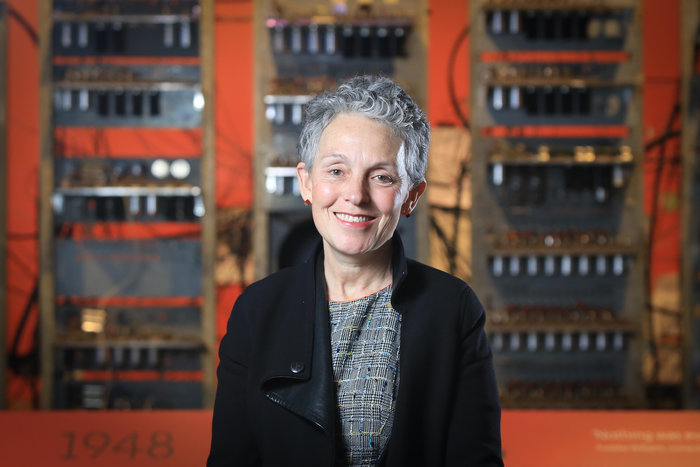It’s almost exactly six years since I became director of the Science and Industry Museum.
Walking into work on this iconic site, so central to Manchester’s phenomenal history as the world’s first industrial city, is a thrilling experience. Being surrounded by artefacts and stories that changed the world – Arkwright’s water frame and ‘Baby’, the world’s first stored programme computer – lifts the spirit. Then there’s the buzz of visitors talking, of children laughing, the hum of working machinery and the noise and excitement of our big science shows. Often the atmosphere is electric. I grew up in Manchester so this museum and the stories it tells are especially meaningful to me. I’ve often told people that this is my dream job.
All of this made it that much more strange and painful when, on March 17, we packed up, put the museum to bed and said goodbye to colleagues not knowing when we’d see them, or our visitors, again.
Thanks to our amazing security team and facilities engineers, we knew we were leaving the museum in safe hands. Throughout lockdown they cared for the site and collections, travelling to work when the rest of us were safe at home. They were the museum’s key workers and we owe them a great deal. Other colleagues, including all our front of house teams and everyone whose work necessitates physical interaction with the collections, went on furlough. Thanks to them and the furlough scheme, as well as the recent government recovery funding, we’ve been able to weather the immediate financial impact that came with shutting the museum.
The rest of the organisation (we are part of the Science Museum Group) transformed with astonishing speed into an online operation. Our teams worked from home and communicated through screens to reinvent just about every aspect of our work and plans.
Of course, there was a lot we couldn’t do. We couldn’t welcome visitors, create exhibitions or work with collections, but with these constraints came some new opportunities. We worked with BBC Bitesize Daily to deliver great science activities for young people and families stuck at home, and use of our online learning resources went through the roof. Unable to plan for the short-term, we had more time to invest in long–term strategies, such as how to make our site more sustainable. With everyone online, meeting colleagues in other museums suddenly got easier, and Manchester’s museums and galleries began meeting regularly and sharing plans for reopening.
Through our planning, we were determined to ‘build back better’. Alongside introducing one-way routes and additional cleaning, we’ve also looked at what we can add to improve the way we work longer term. As a national museum group, we used to travel a lot between sites. In the ‘new normal’ world, most of those meetings can be done online, and we expect to cut our travel budget by around 75 per cent, reducing our carbon footprint in the process.
We’re also busy transforming some of our best loved galleries, such as our evocative Power Hall, to tell newly uncovered stories about Manchester’s people and past. Our visitor journey has also improved. Having introduced free ticketing, we can now keep in touch with visitors, checking in advance if they have special access needs and following up after their visit to understand how we could improve our service. This is something we could never do when visitors simply walked in.
It is truly wonderful to be open again and to welcome visitors back to a museum that is sanitised but an experience that isn’t. There is still loads to do, see and enjoy and many days have been fully booked, which is very heartening, both for us and for other Manchester venues. People are clearly very keen to get out and explore somewhere they know is safe and our visitors are delighted to be back, describing it as a ‘VIP experience’.
In these dislocating times, science has never been more relevant. The Science and Industry Museum is uniquely placed to tell this story and inspire the next generation of Manchester’s innovators.
By Sally MacDonald, Director of the Science and Industry Museum, Manchester
Main image: Sally MacDonald, Director of the Museum of Science and Industry in Manchester in front of the Baby Computer.
 The Science and Industry Museum reopened on August 14, 2020. It is currently open Wednesday – Sunday, 10am – 5pm. Free tickets can be booked two weeks in advance of a visit via its website or by calling 0800 047 8124
The Science and Industry Museum reopened on August 14, 2020. It is currently open Wednesday – Sunday, 10am – 5pm. Free tickets can be booked two weeks in advance of a visit via its website or by calling 0800 047 8124
A safe and enjoyable experience is the museum’s top priority. Visitors are being asked to observe social distancing, wear face coverings, follow one-way routes and book online in advance. In line with the additional measures currently in place across the city and other areas of the North West, visitors are also being asked to only attend with people from their household or support bubble. The most up-to-date information can be found on the museum’s website.














